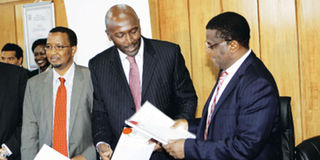8,000 voter kits to arrive in two days

PHOTO | FILE Finance Minister Njeru Githae (right) and Stanchart CEO Richard Etemesi exchange loan documents in Nairobi after the bank gave the Government Sh7.1 billion to buy the BVR kits. Looking on is electoral agency boss Issack Hassan.
What you need to know:
- Fresh registration of voters has been scheduled to start on November 12 by the Independent Electoral and Boundaries Commission (IEBC)
- It is understood that IEBC will hold a media briefing and conduct a tour of the warehouses where the kits will be stored by the end of the week
- Kenya is buying the kits and their accompanying software from the international vendor Safran Morpho in a transaction supported by the government of Canada
The first batch of electronic voter registration equipment arrives in the country on Thursday, clearing the way for listing of voters ahead of the General Election. (Read: IEBC to blame for BVR kits delay, says Wetangula)
The Biometric Voter Registration kits will cost the country Sh7.2 billion. (Read: Treasury ‘not broke despite bid to borrow Sh7.2bn for voter kit’)
Fresh registration of voters has been scheduled to start on November 12 by the Independent Electoral and Boundaries Commission (IEBC).
Electronic registration will ensure a higher degree of credibility of the voting process, according to the IEBC.
The polls agency confirmed the delivery date of the initial 8,000 kits when it briefed a team of Permanent Secretaries at Harambee House on Monday.
It is understood that IEBC will hold a media briefing and conduct a tour of the warehouses where the kits will be stored by the end of the week.
Treasury PS Joseph Kinyua, one of those at the Harambee House meeting, explained that the software and equipment will cost the country Sh7.2 billion contrary to some media reports which suggested that Kenya would pay Sh9.8 billion.
He said that the figure was substantially higher than what was originally planned, mainly because the order had been increased from the original 9,000 to 15,000 kits.
Kenya is buying the kits and their accompanying software from the international vendor Safran Morpho in a transaction supported by the government of Canada.
Contrary to public perception, Canada is not giving any money to the government under the arrangement.
The support of the Canadians is coming through managing the procurement process on behalf of Kenya and also guaranteeing the loan the government is borrowing to pay for the kits.
It is the Canadian Commercial Corporation — a government department that supports commerce — that has procured the supplier and the financiers, the Standard Charted Bank of London.
The guarantee for the loan has been provided by the Export Development Agency of Canada.
The only advantage for Kenya is that the loan guarantee by the Canadians has made it possible for Kenya to borrow at rates significantly lower than a similar loan the government took from an international syndicate of banks in May this year.
The interest margin on the 10-year loan from Standard Chartered of London is 2.15 per cent a year, compared to 4.75 per cent for the loan the government borrowed in May.
Under the arrangement, the government will pay the Canadian Export Development Agency an insurance premium of 1.59 per cent, while the Canadian Commercial Corporation will be paid 0.5 per cent fee.
IEBC Director of Information Communication Technology Dismas Ongondi said the BVR system will guarantee a higher degree of integrity than the previous manual system.
“This is because with a mobile BVR kit, we use your fingerprints to identify you as opposed to the manual system where we rely on details such as ID number and name which you can easily forge,” said Mr Ongondi.
The kit will identify a voter who has registered more than once or one trying to vote more than once.




